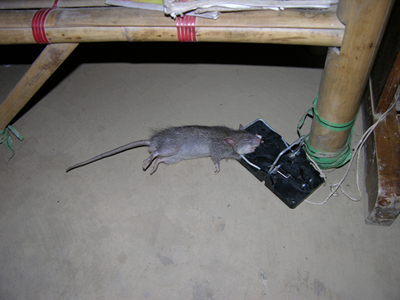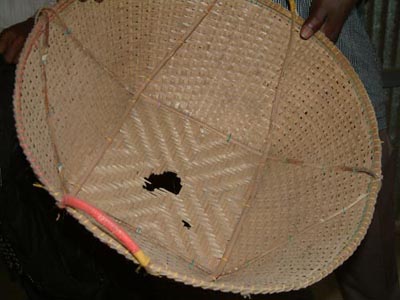Almost any agricultural crop
can be attacked by rodents and they have a significant
effect on people’s livelihoods in many ways, causing damage
to rice and other crops; loss and contamination of stored rice;
damage to buildings; contamination of food and water supplies;
and damage to personal possessions, such as clothes, fishing
nets and furniture. Rodent pests are not only
a serious constraint to the agricultural production of many
crops, but also to the health of people and livestock through
the spread of communicable diseases. Rats are known carriers
of more than 60 life-threatening diseases, including The Plague,
Leptospirosis, Typhus and Viral Haemorrhagic Fevers.
Rodents are a problem for both
rich and poor, individuals and communities, with disproportionately
larger impacts on the rural and urban poor, who are least likely
to possess the tools and knowledge to control rats effectively.
Existing approaches to control rats are often based on the use
of acute poisons. Misuse of these poisons is
unfortunately common in many countries, including Bangladesh,
posing a threat to human health, and also causing environmental
contamination by killing non-target species such as predatory
birds. Used correctly, rodenticides can be a highly effective
tool. However, they are most appropriate in large-scale, intensive,
high-value situations where safety and accuracy can be assured.
The numbers of rodent pests
are increasing worldwide, and this is likely to continue with
urbanisation and agricultural intensification. In Bangladesh,
although some effective rodent control methods exist, their
poor application and adaptation often results in treatment failures,
leading to apathy and widespread acceptance of rodent pests
in the environment. Without a good holistic understanding of
rodent pest problems and the cost-benefits of rodent control,
it can be difficult to convince people that control is achievable
and leads to real benefits.
Previous research on ecologically-based rodent
management developed appropriate rodent management methods that
were shown to lower rodent populations and the damage caused
in rural farming communities. The corner stone of the programme
is community-wide intensive trapping of rats with snap traps
as well as a number of environmental management options that
lead to permanent reductions in rodent populations if they are
adopted by a significant proportion of households.
The main activities of the project
are:
1) Training and capacity building
of institutions to adopt new learning into their development
programmes and to then go on to train and assist rural communities
2) Training and capacity building of rural communities to learn
essential knowledge about rodents, the damage they cause and
how rodent management programmes must operate to be effective
3) Local production and marketing of new-design rat traps. Not
all traps are the same with some trap designs being far more
effective and durable
4) Communication and awareness raising to rural communities,
the general public and policy makers
5) Influence national and stakeholder policies through making
recommendations on how effective and sustainable rodent management
can be delivered and by empowering communities to manage their
own rat problems

Not all rat traps are the same. The
Rat Management
for Rural Communities project will be assisting the manufacture
of better traps which are more
sensitive, efficient, versatile and durable for
the Bangladesh market.

Rat damage to baskets and other personal
possessions can have major economic
impacts on poor families who need to
spend money on repairs to or
replacements of essential goods.
Back to top

















